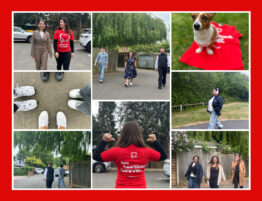
While construction has long been known for its focus on hard work and technical expertise, research suggests that one of the key strengths of our industry comes from it having embraced a broader range of thinking styles and experiences beyond the ‘typical’.
A new study by the Association for Project Management (APM) has revealed that almost half (46%) of construction professionals identify as neurodivergent, compared to a cross-sector average of 31%. Read on to find out more about what this means and the potential benefits this offers for our industry.
What is neurodiversity?
Neurodiversity encompasses several conditions, including autism, attention deficit hyperactivity disorder (ADHD), dyslexia, and dyspraxia. Individuals with these conditions can experience a range of challenges throughout their lives but also often possess unique strengths and perspectives that can be of great benefit for the construction industry. For example, neurodivergent individuals may excel at:
- Problem-solving: Their ability to think outside the box and approach challenges from unconventional angles can lead to innovative solutions and improved project outcomes.
- Creativity: Their diverse thinking styles can spark new ideas for design, materials, and construction methods.
- Attention to detail: Individuals with certain neurodiverse conditions may possess a heightened ability to focus and identify minor discrepancies, ensuring project accuracy and quality.
- Adaptability: These individuals often demonstrate strong problem-solving skills and a willingness to adapt to changing circumstances, essential qualities for an ever-evolving construction environment.
Creating a workplace that embraces neurodiversity can also lead to several organisational benefits, including:
- Increased employee engagement and productivity: When employees feel valued and supported for their unique strengths, they are more likely to be engaged and motivated in their work, leading to improved performance and productivity.
- Enhanced innovation and creativity: A diverse team of thinkers can bring a wider range of perspectives to the table, fostering a more creative and innovative environment.
- Improved talent acquisition and retention: By attracting and retaining neurodiverse talent, construction companies can access a wider pool of skilled professionals and build a more resilient workforce.
Although some challenges exist in creating a fully inclusive environment, the APM survey reveals that 96% of construction professionals with neurodiversity have already disclosed their condition to their employers and 88% of those employers implemented adjustments to accommodate them. This encouraging statistic demonstrates the growing awareness and willingness within the industry to creating a working environment that supports all employees, regardless of their differences.
Commenting on this, APM’s Chief Executive, Adam Boddison, said:
“Employers in construction which embrace neurodivergence not only foster a culture of inclusivity and send out a powerful message that people with neurological differences are valued, but also benefit from unique strengths and perspectives that contribute to creativity, problem-solving and increased productivity. It can also unlock valuable insights into customers and stakeholders, leading to improved services and outcomes. Diversity in all its guises adds value to organisations.
“Overall, the importance of encouraging a neurodivergent workforce cannot be overstated. Individuals must feel empowered and supported to do their best work, and once employers have created optimal conditions, they are more likely to be engaged and motivated, leading to higher levels of job satisfaction, retention rates and overall success across the built environment.”
Take action
Creating a supportive working environment for people with neurodivergent conditions doesn’t have to be complicated. Simple actions like encouraging open communication, implementing flexible work arrangements, or offering access to relevant resources and training can be really effective.
So, if you know or suspect that you (or perhaps someone on your team) have a neurodivergent condition, don’t be afraid to speak out. Talk to your employer about potential adjustments that will help you give your best and let them support you. If you have ideas about adjustments that construction companies could make to give the right support, let us know by commenting over on our Facebook or LinkedIn pages.
22.01.2024
Feature image: Freepik








